Papa Vinyard here, now here's a little somethin' for ya...
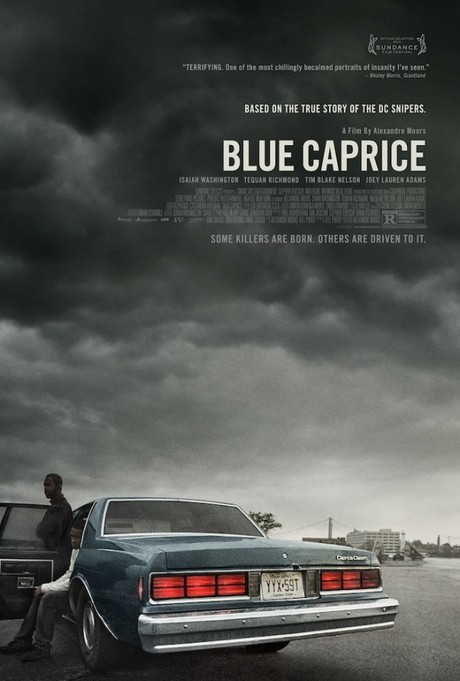
BLUE CAPRICE is a no-nonsense look at the Beltway snipers that rocked the nation in maybe the first real post-9/11 event that made us all shake in our boots again. Alexandre Moors cleverly makes the story less of a lurid, sensational examination of the crimes themselves and more of a relationship drama between the insane, determined Ray Allen Mohammad and his devoted apprentice, Lee Boyd Malvo. Isaiah Washington and Tequan Richmond play the duo, and both give really haunting, realistic performances that try and practicalize what these two men were like without romanticizing them. Washington is terrific as the tough-talking, intelligently mad Mohammad, while Richmond, who serves as the audiences eyes and ears in the story, is tragically lost and malleable while still seeming like a throughly dangerous individual. There's also a pair of sad, bedraggled performances from Tim Blake Nelson and Joey Lauren Adams as a white-trashy couple who takes in Mohammad and Malvo before they go off on their spree. The film is quite unsentimental and affecting before the bodies even start to drop, but when they do, it becomes a striking, eerie look at how easy it would be for someone (or, in this case, two people) with a mind and a purpose to not only murder innocents, but to intentionally put a deathly fear into millions more.
I was lucky enough to get some time with Mr. Washington over the phone a few weeks ago. Here's our discussion, where he goes over his process, what attracted him to the role, what it was like working with first-time director Alexandre Moors (keep an eye out for Moors…he definitely seems like an up-and-coming talent), and what he's learned over a prolific, 20+ year-long acting career:
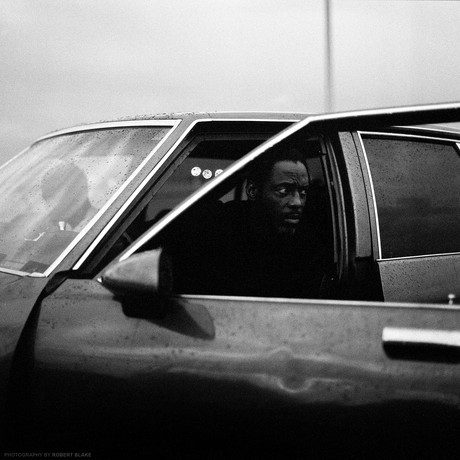
VINYARD: Hello, Mr. Washington, how're you doing?
ISAIAH: I'm good, I'm good. I'm sitting in Vancouver traffic. (we laugh)
VINYARD: First of all, I wanted to say I really enjoyed the movie. I thought it was pretty interesting and really haunting.
ISAIAH: Thank you very much, I'm glad to hear that.
VINYARD: So first of all, what was shooting the movie like? (pause) Specifically, where'd you shoot the movie, how long did it take, what was the budget like, etc.?
ISAIAH: I'm not sure exactly what the budget was. In the beginning, that wasn't my biggest concern. Basically (what we tried to do) was to tell the story that…(director) Alexandre Moors and I discussed and however way we could do that, however hard or fast we needed to go to get that done, that's what we did. (We didn't have) a lot of time or a lot of money to make anything of it until the money started coming in. (When) you start seeing dailies, how the film was shaping up scene by scene, (it) would bode well, obviously, for all of us, because it got us to this point. But it was really, just you know, each day feeling our environment out (to figure out) the best we could do with what we had. (Cinematographer/Producer) Brian O'Carroll was extremely good in figuring out how to shoot this thing in the most efficient way. Obviously he was a producer on it, and he owns his own camera, so that helped with a lot of cost, but overall it was just in the style of the truest form of independent spirit that I've ever known. I hear a lot of people talk about "independent spirit", but I really feel that we pretty much qualified for that just based on how we all came together and what we all wanted to do.
VINYARD: As an actor, do you feel like it's advantageous to work on a smaller movie like this, as opposed to something with a bigger budget, and more expectations from a studio?
ISAIAH: I don't look at any project, big or small- I don't think of it in those terms. I never have, and I never will. I only go with the story, and at the end of the day, I don't get paid for what I do. I get paid to deal with the politics of what I do. Being a professional, to take care of my family and deal with their everyday necessities that any human being needs to sustain themselves. That's what I get paid for. Ultimately, as an artist, speaking truly for myself from a business perpective, really, is that I try and look to see what is the best, most interesting story that could be told through me, my instrument, which is me, and everything that I embody. So I don't look at figures, I look at how big the story is, and I just thought that the story Alexandre wrote was big, it was scary, it was challenging, and I knew it would be hard emotionally and spiritually and just going against everything in my philosophy on life about the biases I had toward the character. So that story was the thing that attracted me. The other part of that is- I think we often surmise that this would not be the typical kind of film that a Hollywood studio would get behind. If it were, I probably- certainly wouldn't be starring in it, and Alexandre Moors probably, you know, would've taken longer to get money for it. I mean, I can pretty much surmise that that would've been the case. That's why we obviously went the independent route, so we could have more control of the content and how we wanted to tell the story, and what actors he wanted, and apparently I was his first and only choice for the role. When you go into a Hollywood system, you have many more tentacles and connective tissue to contend with than you do when you go off on something that was at the independent level in which we worked. I hope that answers your question.
VINYARD: Ok. For you, what do you think the hardest scene to shoot in the whole movie was?
ISAIAH: (pause) It all was tough, you know? It was very strategic, very reliant on a whole other level of performance technique that I relied on in my career, you know, finding those moments that were more subtle than the subtleties there in the piece. And I had- I was completely blind to all of it, I just had to- I had no problems from the onset trusting…Alexandre's vision implicitly. For the first time, I just came to it in a way where I just trusted my director. I believed in him so much, I watched his body of work on his website, and I just like the concept of vision that it was going to be about whatever he wanted and needed me to do. And I was there to be that voice and convey those ideas however he wanted to do it, and I've never really worked like that ever, where I just came in and just said, "Hey man, I'm here. Mold me. Direct me." And most actors are not really comfortable with that, giving themselves up totally to another human being, let alone a director, and trust that everything they're going to tell you is going to benefit not only your performance, but the entire film. I've never experienced that before, and there were some things where my innate feeling was to go against him because I wasn't comfortable with it, or I wasn't used to it, and I ended up wrong, and he ended up being right. It was a wonderful experience for me to grow as an artist, and as an actor, and primarily as a human being to know what it feels like to trust another artist to guide you on a path that you may or may not have gone on without his goading, or pushing I should say (laughs).
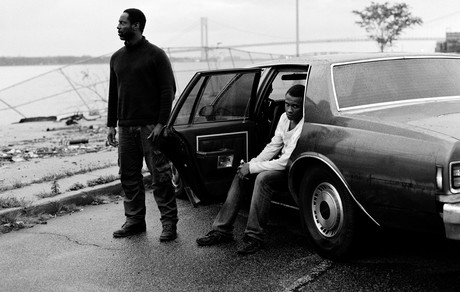
VINYARD: Sure. What about (co-star) Tequan Richmond, what was your experience like working with him?
ISAIAH: Hey, it's up on the screen bro.
(I laugh)
ISAIAH: It is what you see and what you feel. He's fantastic. I knew, early on, that tastes are what they are, and this film could've not pushed one single button in the film community or in the world. But I disagreed, because I'm still a human being, and i've traveled the world and seen some things, and I know what I feel. And I knew, right off, from day one, first day of shooting, that this young man Tequan Richmond has got it. He was clear on what it is that we were trying to do, and he did it. There's really nothing more I can really say. I mean, you look at the film and…it's all there. I mean, it's difficult for any seasoned actor to convey all the thoughts, the emotions, and the complexity of his part in the film, with having probably less than maybe, I don't know, 10 words he said in the whole film. (we both laugh) That's difficult for the most seasoned actor, and he pulled it off.
VINYARD: As an actor, what (do you think about) John Allen Muhammad? What do you think his arc was like? What do you think his life feelings were toward Lee Boyd Malvo, at least as an actor?
ISAIAH: That's an impossible question to answer. I have absolutely no idea. The guy is a murderer. How do I know what he was thinking? I have no idea. (he laughs)
VINYARD: The real life figure aside, but as an actor, in your performance-
ISAIAH: I'm an actor! I'm an actor, I'm not a psychologist, or a criminal psychologist. I have no idea. All I know is that we were telling the story about a father/son relationship based on some horrible incidents that were committed by a man who, in his mind, had reasoning- based on the research that I did on him, I could see how, in his mind, he could justify what he was doing, but at the end of the day…I'm not in line with taking people's lives, as a last resort or otherwise. That's not my thing. Even if you're in a situation when you have to defend yourself. And even now, with "Stand Your Ground" laws, that can get a little murky and complex. It's very difficult for me to answer what this guy was thinkin', I have absolutely no idea. But I think the end result is very clear; he had intentions to hurt a lot of people.
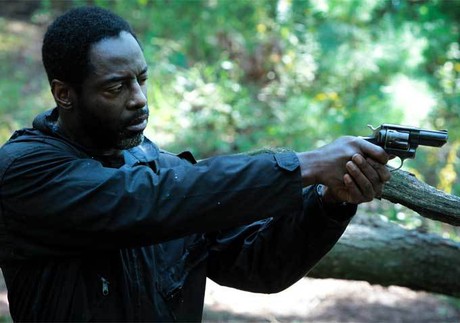
VINYARD: Right. There's a bunch of scenes where you brandish firearms, including what looks to be a pretty big sniper rifle in the scene in the basement. Did you have any training for that for this movie?
ISAIAH: I only brandish two weapons. That is the rifle in the basement, not pointed at anybody- you don't even see what I'm shooting at! The second time I touch a firearm in the film is handing the pistol to the kid who you definitely see, flat out, shoots a human being in the back. So, no. I love that about the film, and I love that about my character, is that you don't see my character kill anyone in the film. But you certainly see the boy take out a few people.
VINYARD: Alexandre Moors had never worked on a project before- like you said, he has a bunch of work up on his website, but he'd never worked on a feature before as a director. What was it like working with him on his first full-length feature film?
ISAIAH: I didn't know he didn't do a feature! I was so caught up in his film, ("N*** In Paris") that Kanye West directed, but I sensed that Alexandre Moors had a lot to do with the direction of that wonderful video called "Runaway" (Moors' official credit was "Art Director" on those shoots). I was so taken with his work, that I assumed that the shorts I was watching were trailers for his feature films. I was so impressed with his work, it wasn't until week 3 out of 4 weeks of shooting that his wife said, "Thank you so much, Isaiah, for being here. We didn't think we could get you, thank you so much for working on Alex's first film!" And I almost threw up in my mouth, like "What the fuck are you talking about?!" (we laugh) "This is not his first film!" I walked over to Isen (Robbins, a producer on the film), I said, "Isen, can I talk to you for a second?" Dude says "Uh, yeah?" I say to him, "This is Alex's first film?" And he says, "Oh, yeah, I've been meaning to tell you about that Isaiah." (laughs) I had no idea! I had no idea, it was brilliant. IT was the most brilliant sensation I've ever had in my career. It was like, "Are you kidding me?! This guy is grabbing the camera like Steven Soderbergh, or Clint Eastwood, or Vittorio Storaro, all the greats I've ever worked with, no different from Malik Hassan Sayeed, Arthur Jafa, Spike Lee. I mean this guy was so comfortable on the set, he was such a trooper, and a general leading this film that I was like "This is impossible that this is his first film! Impossible!" That alone, yet again, as a producer, it impressed me again knowing my instincts were correct about this guy, that he was ready to tell this story. And just like the beginnings of a Martin Scorsese and MEAN STREETS, everybody's gotta start somewhere on their first film you know? Ted Witcher on LOVE JONES, the guy hasn't made a movie since. That was 15 years ago, almost 17 years ago. But he had a full command of the story in that film, and that film is now considered a classic. I'm very proud of working with him. You never know, but the good news is when you have a gut feeling about something or someone as an artist, and then they exceed every bit of your expectations, that's…couldn't get any better than that, bro. Couldn't get any better than that.
VINYARD: You mentioned a few named of people you worked with, like Vittorio Storaro, Soderbergh, Clint Eastwood. Was there ever anyone- Who were you the most honored to work with, as an actor?
ISAIAH: (laughs hard) Again, that's impossible to answer. I'm not gonna go there, I'm gonna offend someone. I love 'em all like my children (we both laugh). All the experience has enlarged me as an artist, and as a businessperson, and a business- when I'm in this business, as a human being, thoroughly blessed and grateful for each and every one of the opportunities, and have been enlarged by each and every one of them. And I'm still going from those experiences, because the one thing that all of them gave me, in all of their authority and their expertise, they gave me a full understanding of how to go about trying to find the right tone, and the right project to move mountains. I've been thoroughly inspired by those experiences, so I look back at my experience just working with all those greats, and try and inform how I make my choices when I do look at projects, and make the decision to go and tell the story. Some of those situations I've done, and the budgets have millions of dollars, but the film didn't turn out to be anything that I could be proud of. It really doesn't have, in my opinion, anything to do with the money; again, it has everything to do with story, and ultimately, the ability of that director and those producers- particularly the director, and if he's the writer as well, is to execute that vision. When you get it right, people will let you know, positively. You get it wrong? People will let you know negatively.
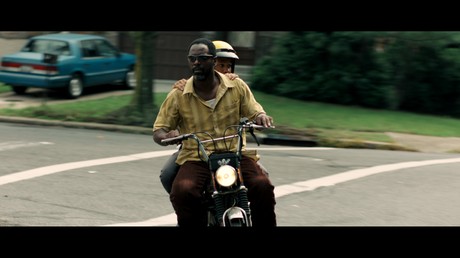
VINYARD: What about Spike Lee, in particular, who you made four movies with. Is there anything you took from your experiences with him back in the '90s?
ISAIAH: (pauses) You know, I caught Spike at a very interesting time. I caught Spike, I think, at a transitional period where the stories he was telling were more nostalgic- for example CROOKLYN was written by his sister (Joie Lee), and was actually based on his life, and then CLOCKERS came around when he was pretty much fed up with the idea of the BOYZ N THE HOOD, although it was a fantastic film, and MENACE II SOCIETY, it just painted a picture of- it appeared to be heightening the violence in the black community, but not showing you how the violence arrives, or what the psychological aspects can be that can make a child pull the trigger in those worlds. And that's why I'm fond of CLOCKERS, he took a different path with telling that story, and I think pretty much put the nail in the coffin on those kind of stories behind told or really getting supported by Hollywood so easily, because it was just rapacious and rampant violence and not really any real sense of understanding of where the violence was coming from. So I was really proud to see him take that issue on, and then he got very experimental with GIRL 6, and I'm very proud of the film GET ON THE BUS, that we had these different- clearly different African-American men all stuck on one bus going on one mission, but you know, also selling to the world that just because we're African-American men doesn't make us the same. We certainly don't have the same views, religion, philosophies, sexual orientations, we're all different kinds of African-American men. The only thing we do share is our skin color, and even that varies, you know? We have lighter-skinned men who use the politics of being light-skinned and dark-skinned, and I'm very proud that we took on that script by Reggie Rock Bythewood, who I had a chance to work with again later on a film that I'm very proud of, that we did it independently and sold to HBO called DANCING IN SEPTEMBER, where I played an African-American television executive. That was taking on the politics of television, and how to stay in television and being an African-American leader in television, and trying to negotiate the landmines of both career and the politics of that. I've had some extraordinary experiences, man, to be able to look at someone like Alexandre and the up-and-coming people that are gravitating to me through my Facebook that have been watching my work and know that, ultimately, I'm an artist, but I'm also about social change, as well. As a human being, when I get tired of looking at stereotypes or negatives, then I try and go out there and put myself in those situations and spark conversation and dialogue about it, so people can hopefully be changed, or enlarged by what they have seen. I try not to call my work political, but it's kinda hard not to, just because those are my interests and concerns in the world. Obviously there's a lot of weapons in America, and there's a lot people hurting people with those weapons, and most of them own their own firearms. The fact that the timing of something like BLUE CAPRICE is coming out to continue that dialogue, I think it's a neccesary dialogue that we all need to be having. I'm in Canada right now, and I'm not hearing anything in the news every day about rampant murders, although there have been (some) here, but not at the rate that it's happening in the "home of the free and the brave".
VINYARD: Yeah. Well, OK, I guess I'll let you go, Isaiah, and thanks for answering my questions.
ISAIAH: Oh man, my pleasure, my pleasure.
BLUE CAPRICE opens in limited release this Friday, and then hits VOD the following Tuesday (September 17th).
-Vincent Zahedi
”Papa Vinyard”
vincentzahedi@gmail.com
Follow Me On Twitter
